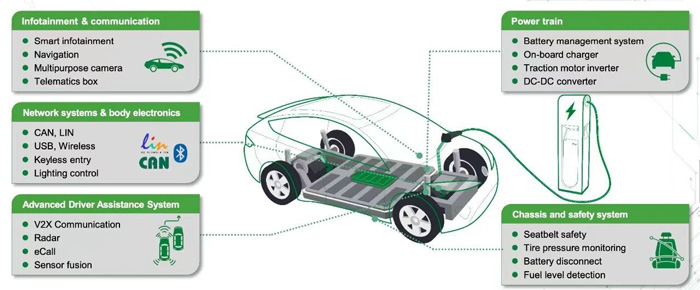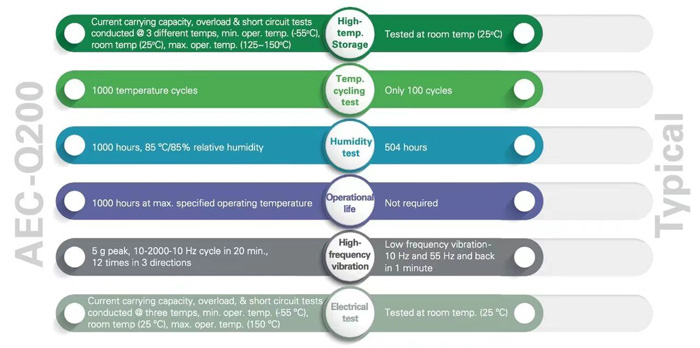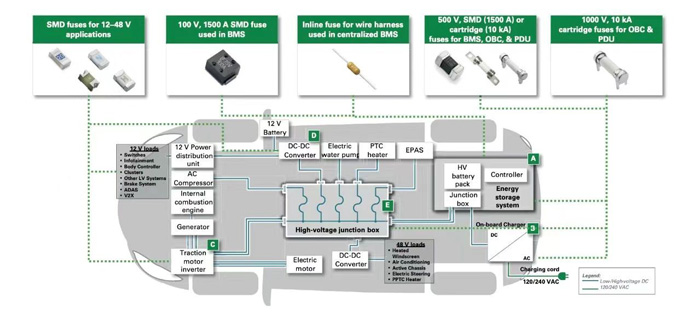Based on the particularity of automotive application scenarios, components that can be used in this field must withstand more stringent quality and reliability tests than consumer-grade and industrial-grade products. If component manufacturers can produce automotive-grade products and implement them in automotive applications, it will help them occupy a place in the semiconductor industry.
What Kind of Components Can Be Applied to Automotive Applications?
The American Automotive Electronics Council (AEC) developed the AEC test specifications. It is a universal certification and quality system standard for automotive components and is recognized by the industry. Once the component passes the test, it will be marked AEC-Q in the datasheet, which means that it has passed the vehicle certification and can be applied to automotive applications.

Source: Littelfuse
The revised AEC-Q200 Rev E standard released this year includes test requirements for Fuses, which can eliminate cognitive differences caused by a lack of specifications and is beneficial to component manufacturers and automotive electronics developers.
AEC standards include AEC-Q100 and AEC-Q200, etc. The AEC-Q200 standard is the most stringent, stipulating that components must pass environmental reliability and physical property reliability tests, and the properties must remain unchanged before and after testing. It is mainly for passive components, including capacitors, resistors, inductors, transformers, resonators, crystal oscillators, thermistors, varistors, etc., while AEC-Q100 is only suitable for integrated circuits (ICs). However, there is a commonly used circuit protection component, Fuses, that does not have standard specifications.
With the popularity of new energy vehicles and the trend of intelligence, fuses are increasingly used in automotive electronic equipment. Before the release of the new standard, fuse suppliers could only prove the quality of their products through their own testing specifications, which significantly increased the workload of both suppliers and purchasers during selection.

Source: Littelfuse
The AEC-Q200 Rev E standard allows manufacturers to save the need to build their own automotive-grade product testing platforms, and product quality can be certified. It also speeds developers on selection.
When the new standard comes out, it will inevitably trigger competition among car-grade fuse manufacturers. Among them, Littelfuse has quickly launched its AEC-Q200 automotive-grade fuse portfolio, and its categories are complete, covering many applications in new energy and smart automotive. The reason why Littelfuse can launch products that meet the specifications so quickly is actually foreshadowing.
Littelfuse has decades of technical accumulation in the fuse field. Its rich product portfolio and professional experience make it easy to develop new products. Before the launch of the new AEC-Q200 standard, Littelfuse had already established a complete quality system and testing specifications and occupied a place in the automotive field. Besides, Littelfuse is a member of the AEC Technical Committee, and the new standard includes its professional contributions.

Source: Littelfuse
Fuses are used in vehicle systems and functional circuits such as battery detection systems, vehicle chargers, power distribution systems, traction click inverters, communication systems, and visual sensor units to provide overcurrent protection and ensure their safe and reliable operation. However, different application scenarios require different fuse characteristics, so specified fuses must be developed for different needs to maximize their effectiveness.
Littelfuse AEC-Q200 fuse portfolio includes Surface Mount Fuses, Cartridge Fuses, and PICO II ceramics Fuses. All can provide high surge current withstand capabilities for target applications to achieve circuit protection against abnormal overloads and surges.
Surface Mount Fuses
Littelfuse Surface Mount Fuses can operate at ambient temperatures up to 150°C, and are available in fast-acting, high I2t, and high voltage types. They are suitable for high voltage, low voltage, high voltage and small current, low voltage and large current, and other different application scenarios, bringing great flexibility to the design.

Source: Littelfuse
437A, 438A, and 440A series fast-acting fuses are small current, low voltage series products with excellent temperature stability and reliability. They are used in BMS battery management systems, high-voltage DC-DC converters, car navigation systems, sensor circuits, etc. It can be used in TFT displays and vehicle infotainment systems.

Source: Littelfuse
High-current, high-voltage products include 881 and 885 series fuses, which can work in high-voltage circuits rated 100V and 500V respectively. The 881 series fuses have current ratings up to 100A. Both series of fuses have segment ratings of 1500A and are primarily used to protect lithium-ion battery modules in battery packs.
Cartridge Fuses
Littelfuse Cartridge Fuses are mainly targeted at high voltage and high current applications above 500V. Representative products include 526, 527, and 828 series, all of which have high-rated breaking current (10kA), high breaking capacity, and compact design. The operating temperature range is -55 ℃ to +125℃, it can provide overcurrent protection for vehicle chargers and power distribution devices.

Source: Littelfuse
The 526 and 527 Series high voltage fuses are available in current ranges from 30A to 60A and voltage ratings up to 500VAC. The 828 Series fuses have a high voltage rating of 1000VDC and are available in through-hole and bolt-on configurations.
PICO II Fuses
Littelfuse PICO II 521 Series Fast-acting Fuses are available in a space-saving ultra-miniature lead and tube package with a rated current of 2A and a rated voltage of 75V. Its outstanding feature is that it can break 200% overcurrent within 1 second, with a rated breaking current of 300A, which is very suitable for providing overcurrent protection for battery management systems and wiring harnesses.
Conclusion
Except for Littelfuse, Bourns SinglFuse SMD Fuses are also certified by AEC-Q200. Whoever has developed AEC-Q200 Fuses, it is beneficial for automotive developers to select qualified Fuses to make sure the electric vehicles are more reliable and safe.